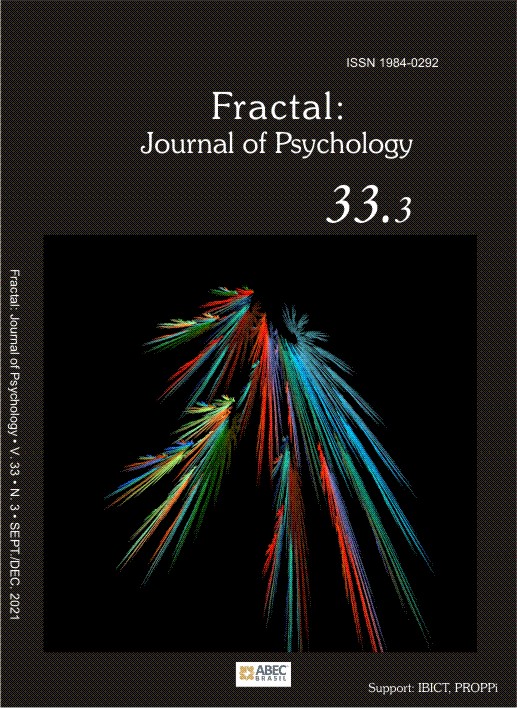Defensive strategies against psychic suffering among workers
DOI:
https://doi.org/10.22409/1984-0292/v33i3/5899Keywords:
psychological distress, defensive strategies, Nietzsche, DejoursAbstract
This article is meant to consist in a contribution towards worker’s mental health understanding. To achieve this goal, we tried to briefly present, as background scenery, the context of work from a historical perspective. The expansion of the capitalist model, in the second half of the 20th century, engendered a progressive increase in the number of average working hours per worker and a continuous increase in time expenditure related to work issues, which seem to be issues that caused tangible effects on workers general health. This work has tried to pursue an evaluation of the successful worker profile, seeing suffering as a relatable presence in his or her working context and, as Dejours and Nietzsche tragically realize, in the understanding of suffering as an unavoidable and inherent feature of life. Besides that, the present article sought to understand precisely how these authors relate themselves with the perception of suffering within working organizational context and how they relate to defensive strategies aimed at mitigating it - which may bring dubious results given that they may either increase or decrease workers mental health condition. Finally, the present study emphasizes the importance of professionals capable of critical thinking and, also, of a working space that enables the perception of suffering process as a form of making mental health equilibrium achievable to the average worker. The research methods of choice were qualitative analysis review of bibliographic sources, and the adopted theoretical framework was technically related with literature in the fields of Psychodynamics of Work and Philosophy. The established result is that pain and suffering are meant to be understood as something inherent to every form of work activity that has a defining character in worker’s subjectivity.
Downloads
References
AQUINO, Cassio Adriano Brás de. O processo de precarização laboral e a produção subjetiva: um olhar desde a psicologia social. O Público e o Privado, v. 6, n. 11, p. 169-178, 2008. Dossiê Mundo do Trabalho. Disponível em: https://revistas.uece.br/index.php/opublicoeoprivado/article/view/2383. Acesso em: 4 out. 2020.
AQUINO, Cassio Adriano Brás de; MARTINS, José Clerton de Oliveira. Ócio, lazer e tempo livre na sociedade do consumo e do trabalho. Revista Mal-estar e Subjetividade, Fortaleza, v. 7, n. 2, p. 479-500, set. 2007. Disponível em: https://periodicos.unifor.br/rmes/article/view/1595/3577. Acesso em: 19 maio 2020.
CARRASQUEIRA, Flora; MORAES, Rafaela Mayer; SOBOLL, Lins Andrea. Desejo de carreira, flexibilidade e engajamento: o perfil do trabalhador de sucesso na cultura do management. In: SOBOLL, Lins Andrea; FERRAZ, Deise Luiza da Silva (Org.). Gestão de pessoas: armadilhas da organização do trabalho. São Paulo: Atlas, 2014. p. 216-232.
DEJOURS, Christophe. Entre sofrimento e reapropriação: o sentido do trabalho. In: LANCMAN, Selma; SZNELWAR, Laerte Idal (Org.). Christophe Dejours: da psicopatologia à psicodinâmica do trabalho. Rio de Janeiro: Paralelo 15; Fiocruz, 2004. p. 303-316.
DEJOURS, Christophe; ABDOUCHELI, Elisabeth. Itinerário teórico em psicopatologia do trabalho. In: DEJOURS, Christophe; ABDOUCHELI, Elisabeth; JAYET, Chrístian (Org.). Psicodinâmica do trabalho: contribuições da escola dejouriana à análise da relação prazer, sofrimento e trabalho. São Paulo: Atlas, 1994. p. 119-145.
DEJOURS, Christophe; DESSORS, Dominique; DESRIAUX, François. Por um trabalho, fator de equilíbrio. Revista de Administração de Empresas, São Paulo, v. 33, n. 3, p. 98-104, 1993. https://doi.org/10.1590/S0034-75901993000300009
FARIA, José Henrique de; RAMOS, Cíntia Letícia. Tempo dedicado ao trabalho e tempo livre: os processos sócio-históricos de construção do tempo de trabalho. RAM, Revista de Administração Mackenzie, São Paulo, v. 15, n. 4, p. 47-74, 2014. https://doi.org/10.1590/1678-69712014/administracao.v15n4p47-74
GOULART, Irís Barbosa. Psicologia do trabalho e gestão de recursos humanos: estudos contemporâneos. São Paulo: Casa do Psicólogo, 2007.
JOST, Rossana; FERNANDES, Bruna; SOBOLL, Lis Andrea. A subjetividade do trabalhador nos diversos modelos de gestão. In: SOBOLL, Lis Andrea; FERRAZ, Deise Luiza da Silva (Org.). Gestão de pessoas: armadilhas da organização do trabalho. São Paulo: Atlas, 2014. p. 48-66.
NIETZSCHE, Friedrich (1881-1882). A gaia ciência. In: ______. Obras Incompletas. São Paulo: Victor Civita, 1974. Coleção Os Pensadores. p. 195-231.
NIETZSCHE, Friedrich. O Nascimento da Tragédia, ou Helenismo e Pessimismo. Tradução, notas e posfácio de Jacó Guinsburg. São Paulo: Companhia das Letras, 2007.
SARAIVA, Luiz Alex Silva; MENDES, Ana Magnólia. Consultores de mercado, sua lógica perversa de gestão e normopatia. Revista Polis e Psique, v. 4, n. 1, p. 128-145, 2014. https://doi.org/10.22456/2238-152X.42769
SILVA, Edith Seligman (Org.). Psicopatologia da violência e suas expressões clínicas. In: ______. Trabalho e desgaste mental: o direito de ser dono de si mesmo. São Paulo: Cortez, 2011. p. 492-550.
SOBOLL, Lis Andrea; HORST, Ana Carolina. Ideologia da excelência. In: VIEIRA, Fernando Oliveira; MENDES, Ana Magnólia; MERLO, Alvaro Roberto Crespo (Org.). Dicionário crítico de gestão e psicodinâmica do trabalho. Curitiba: Juruá, 2013. p. 225-230.
Downloads
Published
How to Cite
Issue
Section
License
Copyright (c) 2022 Fractal: Journal of Psychology

This work is licensed under a Creative Commons Attribution 4.0 International License.
Authors publishing in this journal agree to the following terms:
- Authors retain copyright and grant the journal the right of first publication, with the work simultaneously licensed under the Creative Commons Attribution License allowing sharing of the work with acknowledgement of authorship of the work and initial publication in this journal.
- Authors are permitted to enter into additional contracts separately for non-exclusive distribution of the version of the work published in this journal (e.g., publishing in an institutional repository or as a book chapter), with acknowledgment of authorship and initial publication in this journal.

This work is licensed under a Creative Commons Attribution 4.0 International License.
To the extent possible under the law, Fractal: Journal of Psychology has waived all copyright and related rights to the Reference Lists in research articles. This work is published in: Brazil.
To the extent possible under law,Fractal: Journal of Psychology has waived all copyright and related or neighboring rights to Reference lists in research articles. This work is published from: Brazil.







